 Briefly discuss Harry (background-personal and as a grower to current position General Manager Sunland Flowers)
Briefly discuss Harry (background-personal and as a grower to current position General Manager Sunland Flowers)
My name is Harry Kruger and I am the General manager of Sunland Roses Ltd. Before I came to Kenya to farm Hybrid Tea roses I studied Viticulture and Pomology in South Africa. I was busy making wine when I saw the opportunity by working in Kenya.
How do you see the future for African rose growers? What should they focus on to survive?
The world in general seems to have contradicting ideas about African rose growers. Some I’ve met still think that growers in Africa and especially in East Africa are still only concerned with the auction style of growing. African growers need to concentrate on optimizing the size of their businesses and focus more on quality rather than quantity. That being said, there are still many brilliant farms that grow for auction and that is great, but we should realize that the world is constantly changing and that the direct market is a huge force behind some of those changes. Without going into too much detail, the scenario is basically the following; other countries have been supplying the direct market place with very high quality stems for a long time and the growers in East Africa are fairly new in the game, so to speak. This is not to say that we lack anything or have inferior quality roses, but some markets seem to have this stigma, that long stemmed top quality Hybrid Tea roses do not come from Africa, but rather South America. This was perhaps true in the past, maybe about ten or fifteen years ago, but is no longer the case. Kenya, for one, produces stems that in my mind can definitely rival those from any other country. The goal should be to get markets to realize this and not simply put our flowers in the back and focus on the other countries they’re used to in the past.

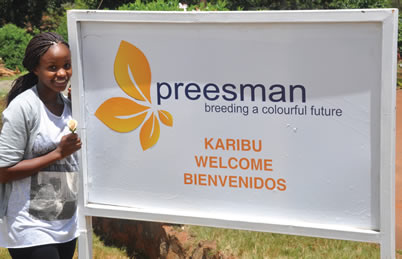 When I first visited Preesman’s new show case at Thika, it was on invitation of Jelle Posthumus, the commercial manager, Preesman. I met a team honoured to satisfy the curiosity of their customers who kept on tripling every minute courting for their attention. By count I could not tell the number of times they walked in to the new show case with a different customer then back to the reception area for either continual discussion with the same client or for a fresh discussion with a new client. On a close follow up, I realized that inside the show case was more technical and less commercial whereas in the reception was more commercial and less technical. These men had a wide knowledge of the two worlds of rose breeding. In between the customers, I stole some few minutes and managed to get a few minutes of interview with several of them.
When I first visited Preesman’s new show case at Thika, it was on invitation of Jelle Posthumus, the commercial manager, Preesman. I met a team honoured to satisfy the curiosity of their customers who kept on tripling every minute courting for their attention. By count I could not tell the number of times they walked in to the new show case with a different customer then back to the reception area for either continual discussion with the same client or for a fresh discussion with a new client. On a close follow up, I realized that inside the show case was more technical and less commercial whereas in the reception was more commercial and less technical. These men had a wide knowledge of the two worlds of rose breeding. In between the customers, I stole some few minutes and managed to get a few minutes of interview with several of them.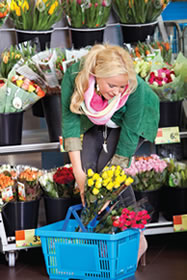 For many years, Dutch Flower Group (DFG) has been active in Africa and especially in Kenya, with respect to sourcing African products, like roses and carnations, as well as other varieties of cut flowers and foliage.
For many years, Dutch Flower Group (DFG) has been active in Africa and especially in Kenya, with respect to sourcing African products, like roses and carnations, as well as other varieties of cut flowers and foliage.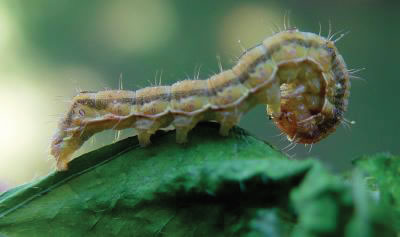 Caterpillars are seasonal pests to the flowers but when in season result in major losses to the flower industry as one caterpillar can cause damage to more than one flower. In flowers there are different kinds of caterpillar species which include helicoverpa armigera and spodopteraexigua and thus it’s important to know the exact pest that one has in their crop and out of these two, the helicoverpa species is the notorious and listed as a notifiable pest in the European market.
Caterpillars are seasonal pests to the flowers but when in season result in major losses to the flower industry as one caterpillar can cause damage to more than one flower. In flowers there are different kinds of caterpillar species which include helicoverpa armigera and spodopteraexigua and thus it’s important to know the exact pest that one has in their crop and out of these two, the helicoverpa species is the notorious and listed as a notifiable pest in the European market.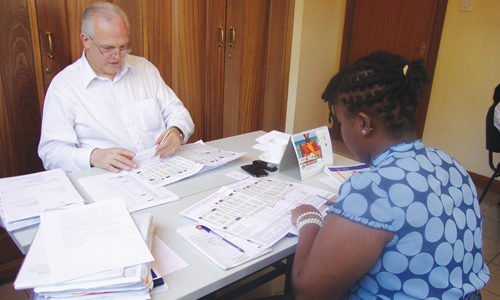 The International Flower Trade Expo (IFTEX) now enters its third year in Nairobi, Kenya, with high expectations on both quality and quantity from the organizers, exhibitors and visitors. The show, which debuted in March 2012, is quickly developing a magnetic pull for the flower industry fraternity not only in Africa but the world over.
The International Flower Trade Expo (IFTEX) now enters its third year in Nairobi, Kenya, with high expectations on both quality and quantity from the organizers, exhibitors and visitors. The show, which debuted in March 2012, is quickly developing a magnetic pull for the flower industry fraternity not only in Africa but the world over.
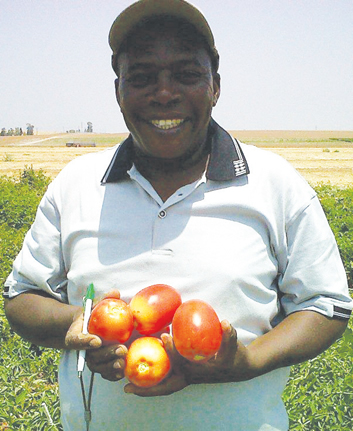 Briefly discuss Wilfred Muthamia (background and chief agronomist Amiran Kenya Ltd) I was brought up in a farming community and had keen interest in Agriculture since my early childhood. For instance I headed the 4K club (Kungana, kufanya, kusaidia Kenya) where we practiced vegetable growing and rabbit keeping.
Briefly discuss Wilfred Muthamia (background and chief agronomist Amiran Kenya Ltd) I was brought up in a farming community and had keen interest in Agriculture since my early childhood. For instance I headed the 4K club (Kungana, kufanya, kusaidia Kenya) where we practiced vegetable growing and rabbit keeping.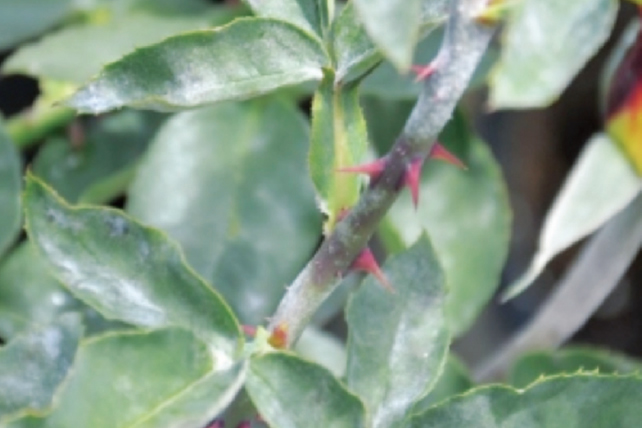 Powdery Mildew BluesThe farmers’ constant nuisance Powdery mildew has since time immemorial wrecked havoc to the farmers and still with the modern science continues to be an headache among farming communities, dare ask a Rose grower, cucumber, mango, strawberry to name but a few, which disease consumes their time, labor and resources more, surely he/she will not forget powdery mildew.
Powdery Mildew BluesThe farmers’ constant nuisance Powdery mildew has since time immemorial wrecked havoc to the farmers and still with the modern science continues to be an headache among farming communities, dare ask a Rose grower, cucumber, mango, strawberry to name but a few, which disease consumes their time, labor and resources more, surely he/she will not forget powdery mildew.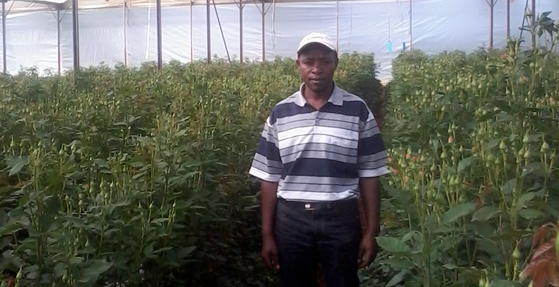 All of the management positions in flower business contribute to the overall success of the operation. Perhaps none has a more direct hand in the ultimate quality of the company’s product, however, than the head grower. It’s a position that has evolved over time from skilled plantsman to grower, trainer, communicator, business manager and leader.
All of the management positions in flower business contribute to the overall success of the operation. Perhaps none has a more direct hand in the ultimate quality of the company’s product, however, than the head grower. It’s a position that has evolved over time from skilled plantsman to grower, trainer, communicator, business manager and leader.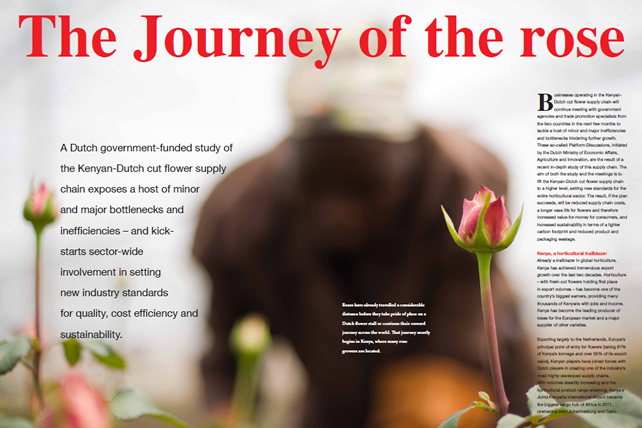 Businesses operating in the Kenyan-Dutch cut flower supply chain will continue meeting with government agencies and trade promotion specialists from the two countries in the next few months to tackle a host of minor and major inefficiencies and bottlenecks hindering further growth. These so-called Platform Discussions, initiated by the Dutch Ministry of Economic Affairs, Agriculture and Innovation, are the result of a recent in-depth study of this supply chain. The aim of both the study and the meetings is to lift the Kenyan-Dutch cut flower supply chain to a higher level, setting new standards for the entire horticultural sector. The result, if the plan succeeds, will be reduced supply chain costs, a longer vase life for flowers and therefore increased value-for-money for consumers, and increased sustainability in terms of a lighter carbon footprint and reduced product and packaging wastage.
Businesses operating in the Kenyan-Dutch cut flower supply chain will continue meeting with government agencies and trade promotion specialists from the two countries in the next few months to tackle a host of minor and major inefficiencies and bottlenecks hindering further growth. These so-called Platform Discussions, initiated by the Dutch Ministry of Economic Affairs, Agriculture and Innovation, are the result of a recent in-depth study of this supply chain. The aim of both the study and the meetings is to lift the Kenyan-Dutch cut flower supply chain to a higher level, setting new standards for the entire horticultural sector. The result, if the plan succeeds, will be reduced supply chain costs, a longer vase life for flowers and therefore increased value-for-money for consumers, and increased sustainability in terms of a lighter carbon footprint and reduced product and packaging wastage.